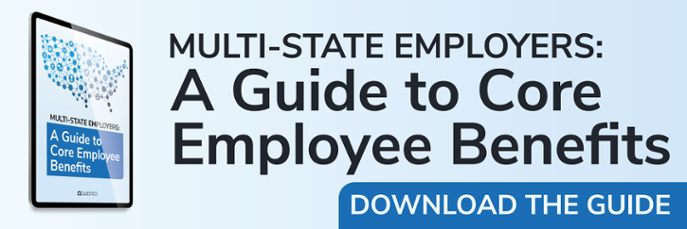Topic Outsourcing HR / PEO,
Why Multi-State Employers Love PEOs
.jpg)
September 24, 2021 | By Jason Randall
.jpg)
Remote work is becoming more and more popular. Part of the appeal to employees is the ability to work from anywhere. Employees can take a new position without moving away from their families or forcing their kids to change schools. They can choose where they want to live.
Unfortunately, this adds significant complexity to both HR and accounting. Having employees in multiple states is great for the employees and can help attract top talent, but it makes for more work for everything from payroll to medical benefits.
Partnering with a Professional Employer Organization (PEO) makes this more straightforward and allows you to ensure that all of your employees get the same benefits.
Challenges for Multi-State Employers
When you hire an employee from a different state (or an existing employee takes advantage of the new remote work policy to move), your business becomes subject to certain laws, policies, and tax obligations in that state.
When it comes to HR issues, several complexities are added.
Payroll
Your employee generally pays income tax in the state in which they live, not the one in which you are located. In a few states, namely Arkansas, Connecticut, Delaware, Nebraska, New York, Pennsylvania and Massachusetts, the convenience of the employer rule applies. If you are based/registered in those states, your employees are liable for income tax in those states and the one in which they live, potentially causing double taxation. The only easy way to avoid this is to register in another state (or allow remote workers to only live in your state).
Workers' Compensation Insurance
Dealing with workers' compensation in multiple states can be expensive. When your employees work in the office, you can put them all on a workers' comp plan in your state, even if one or two drive across a state border.
When they work from home, you will need a plan for each state you have an employee. This eliminates any economy of scale, forces you to pay multiple upfront deposits, and means you must comply with different reporting requirements.
Medical Benefits
Healthcare plans are also typically state specific. When people are in neighboring states, insurance providers generally have some provision for it. However, if you have employees in Vermont and North Carolina, you will need plans for each of them. These plans cost different amounts and have different options, creating a significant management challenge.
Employee Relations
When you have employees in multiple states, you become subject to the various location-specific laws. For example, in California, an employer must issue a final physical paycheck to terminated employees on their termination date. Employees must request that the final paycheck be mailed, or you somehow have to get them to your office to pick it up. Meanwhile, Colorado requires that you disclose wage and benefits information if recruiting remote workers in the state, something you might not be as comfortable doing.
Compliance with all of these rules and regulations is easiest when done with the help of a PEO.
What is a PEO?
A professional employer organization (PEO) is a full-service HR outsourcing service that allows you to hand over most HR administration, including complex payroll functions and benefits administration. PEOs also lower costs significantly by allowing you to spend less on benefits while offering a higher-quality package.
How PEOs Solve Multi-State Employer Problems
PEOs solve your multi-state employer problems in a few ways:
- You don't have to establish multiple accounts in different states.
- The PEO will handle all of your reporting requirements.
- As the PEO handles payments, accounting is streamlined.
- Many PEOs offer nationwide medical plans, allowing for uniform benefits coverage.
- No need to pay multiple upfront deposits on workers' comp as the PEO will take care of it, letting you pay-as-you-go each month.
- The PEO can provide experts to handle questions on what is required in each state.
The Right Way to Handle Employees in Multiple States
Multi-state employers face many challenges. They have to worry about multiple employment laws, taxation in different states, and ensuring everyone has both health insurance and workers' compensation covered. Outsourcing to a PEO means you no longer have to worry about any of it and can enjoy peace of mind and focus on growing your company.
.jpg)
Jason Randall
Jason L. Randall is the CEO of The Questco Companies. He regularly speaks on topics related to strategy, growth, and organizational performance.





